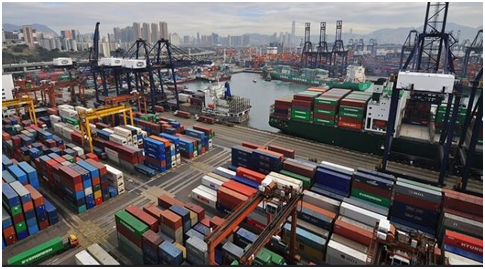
HK saw traffic last year drop 14.1%, to 14.3m teu, establishing the
long-term decline of what was always a leading container port – 20 years
ago it regularly vied with Singapore and Shanghai for the title of the world’s
busiest – deposed from 2023’s tenth ranking by Dubai.
“Dubai overtook two of its nearest competitors in 2023 to make the top
10, a position it previously occupied in 2018. As earlier predicted by
Alphaliner, it moved ahead of Hong Kong, which posted its seventh year of
consecutive volume declines and has now lost a third of its container traffic
over the past decade,” Alphaliner wrote today.
The only other major port to
have suffered a greater fall in volumes than Hong Kong was New York & New
Jersey, which saw its throughput decline 17.7%, to 7.8m teu, for the year.
“It was not alone in the US: Los Angeles, Long Beach and east coast port
Savannah, a surprise feature in the top 30 during the pandemic, saw throughput
drop year on year by 13%, 12% and 16%, respectively.
“Nonetheless, the pandemic has so far been net positive for Long Beach
and New York/New Jersey, with volumes still up on 2019 numbers,” Alphaliner
said.
Last year saw two new entrants
to the top 30 – China’s Qinzhou grew 13.1%, to reach 6.1m teu, in
position 26, while Vietnam’s Cai Mep was ranked 30th with a throughput of 5.6m
teu, flat in terms of growth, but allowing it to overtake Savannah and Manila,
which both posted declining volumes.
Europe’s three largest ports,
and only entrants in the top 30, Rotterdam,
Antwerp-Bruges and Hamburg, each fell two places on the back of
mid-single-digit volume declines, largely attributed to the continuing absence
of Russian transhipment traffic.
Other ports with significant
growth included India’s Mundra which overtook Colombo to become the
subcontinent’s largest box port”.
Meanwhile, the Moroccan transhipment hub of Tanger Med climbed three
places, after 13.4% growth, to reach 8.6m teu, although Alphaliner noted it was
now becoming “dangerously close” to being at its limit. “Volumes for the
Moroccan port have risen 80% since 2019 – last year’s figure of 8.6m teu is
equivalent to 95% of the port’s nominal capacity, and reaches targets set by
the port authority four years ahead of schedule,” it said.
At the top of the rankings
there was no change: Shanghai retained first position, followed by Singapore
and Ningbo.
With a throughput of a little over 49.1m teu, Shanghai needs to see
around 2% growth this year to see it go past the 50m teu milestone in 2024.
Business and competition are
inseparable; they have to be and competition is dynamic as it is related to and
dependent on efficiency. Efficiency is taking competition really seriously
always thinking to be the first.